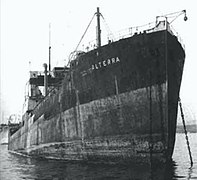Regia Marina
The Regia Marina (Italian for 'Royal Navy'; pronounced [ˈrɛːdʒa maˈriːna]) (RM) or Royal Italian Navy was the navy of the Kingdom of Italy (Regno d'Italia) from 1861 to 1946. In 1946, with the birth of the Italian Republic (Repubblica Italiana), the Regia Marina changed its name to Marina Militare ("Military Navy").[1][2][3]
Not to be confused with Regina Maria.
After the end of hostilities, the Regia Marina started a long and complex rebuilding process. At the beginning of the war, the Regia Marina was the fourth largest navy in the world with a mix of modernised and new battleships. The important combat contributions of the Italian naval forces after the signing of the armistice with the Allies on 8 September 1943 and the subsequent cooperation agreement on 23 September 1943 left the Regia Marina in a poor condition. Much of its infrastructure and bases were unusable and its ports mined and blocked by sunken ships. However, a large number of its naval units had survived the war, albeit in a low efficiency state. This was due to the conflict and the age of many vessels.
The vessels that remained were:
On 2 June 1946, the Italian monarchy was abolished by a popular referendum. The Kingdom of Italy (Regno d'Italia) ended and was replaced by the Italian Republic (Repubblica Italiana). The Regia Marina became the Navy of the Italian Republic (Marina Militare).
On 10 February 1947, a peace treaty was signed in Paris between the Italian Republic and the victorious powers of World War II. The treaty was onerous for the Italian Navy. Apart from territorial and material losses, the following restrictions were imposed:
The treaty also ordered Italy to put the following ships at the disposals of the victorious nations United States, Soviet Union, Great Britain, France, Greece, Yugoslavia, and Albania as war compensation:
The convoy escort Ramb III ultimately became the Yugoslav Navy yacht Galeb. Galeb was used by the late President of the Socialist Federal Republic of Yugoslavia Marshal Josip Broz Tito on his numerous foreign trips and to entertain heads of state.








